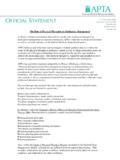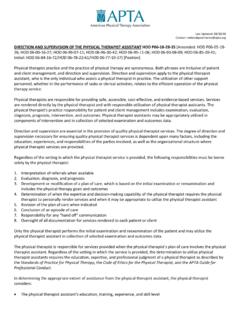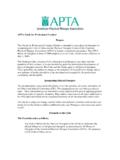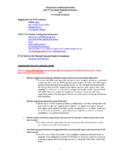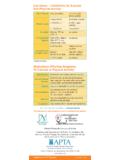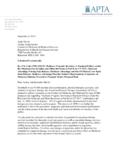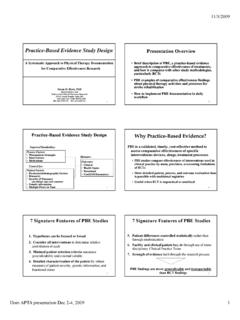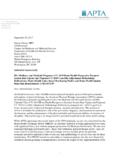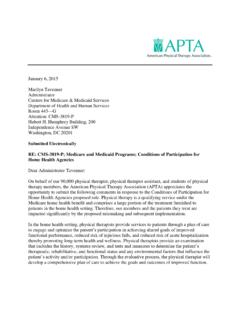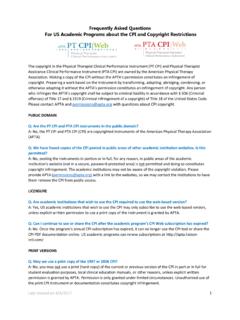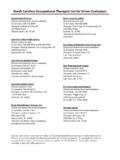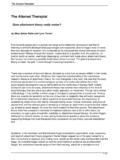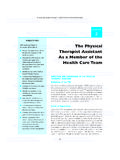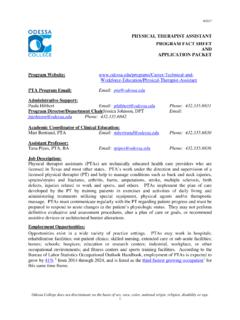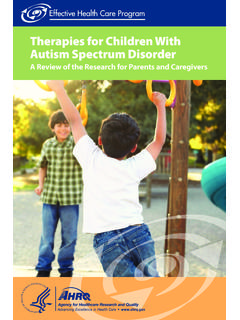Transcription of APTA Guide for Conduct of the Physical Therapist …
1 apta Guide for Conduct of the Physical Therapist assistant Purpose This Guide for Conduct of the Physical Therapist assistant ( Guide ) is intended to serve Physical Therapist assistants in interpreting the Standards of Ethical Conduct for the Physical Therapist assistant (Standards) of the American Physical Therapy Association ( apta ). The apta House of Delegates in June of 2009 adopted the revised Standards, which became effective on July 1, 2010. The Guide provides a framework by which Physical Therapist assistants may determine the propriety of their Conduct . It is also intended to Guide the development of Physical Therapist assistant students. The Standards and the Guide apply to all Physical Therapist assistants. These guidelines are subject to change as the dynamics of the profession change and as new patterns of health care delivery are developed and accepted by the professional community and the public. Interpreting Ethical Standards The interpretations expressed in this Guide reflect the opinions, decisions, and advice of the Ethics and Judicial Committee (EJC).
2 The interpretations are set forth according to topic. These interpretations are intended to assist a Physical Therapist assistant in applying general ethical standards to specific situations. They address some but not all topics addressed in the Standards and should not be considered inclusive of all situations that could evolve. This Guide is subject to change, and the Ethics and Judicial Committee will monitor and timely revise the Guide to address additional topics and Standards when necessary and as needed. Preamble to the Standards The Preamble states as follows: The Standards of Ethical Conduct for the Physical Therapist assistant (Standards of Ethical Conduct ) delineate the ethical obligations of all Physical Therapist assistants as determined by the House of Delegates of the American Physical Therapy Association ( apta ). The Standards of Ethical Conduct provide a foundation for Conduct to which all Physical Therapist assistants shall adhere.
3 Fundamental to the Standards of Ethical Conduct is the special obligation of 2 Physical Therapist assistants to enable patients/clients to achieve greater independence, health and wellness, and enhanced quality of life. No document that delineates ethical standards can address every situation. Physical Therapist assistants are encouraged to seek additional advice or consultation in instances where the guidance of the Standards of Ethical Conduct may not be definitive. Interpretation: Upon the Standards of Ethical Conduct for the Physical Therapist assistant being amended effective July 1, 2010, all the lettered standards contain the word shall and are mandatory ethical obligations. The language contained in the Standards is intended to better explain and further clarify existing ethical obligations. These ethical obligations predate the revised Standards. Although various words have changed, many of the obligations are the same.
4 Consequently, the addition of the word shall serves to reinforce and clarify existing ethical obligations. A significant reason that the Standards were revised was to provide Physical Therapist assistants with a document that was clear enough such that they can read it standing alone without the need to seek extensive additional interpretation. The Preamble states that [n]o document that delineates ethical standards can address every situation. The Preamble also states that Physical Therapist assistants are encouraged to seek additional advice or consultation in instances where the guidance of the Standards of Ethical Conduct may not be definitive. Potential sources for advice or counsel include third parties and the myriad resources available on the apta Web site. Inherent in a Physical Therapist assistant s ethical decision-making process is the examination of his or her unique set of facts relative to the Standards.
5 Standards Respect Standard 1A states as follows: 1A. Physical Therapist assistants shall act in a respectful manner toward each person regardless of age, gender, race, nationality, religion, ethnicity, social or economic status, sexual orientation, health condition, or disability. Interpretation: Standard 1A addresses the display of respect toward others. Unfortunately, there is no universal consensus about what respect looks like in every situation. For example, direct eye contact is viewed as respectful and courteous in some cultures and inappropriate in others. It is up to the individual to assess the appropriateness of behavior in various situations. 3 Altruism Standard 2A states as follows: 2A. Physical Therapist assistants shall act in the best interests of patients/clients over the interests of the Physical Therapist assistant . Interpretation: Standard 2A addresses acting in the best interest of patients/clients over the interests of the Physical Therapist assistant .
6 Often this is done without thought, but sometimes, especially at the end of the day when the clinician is fatigued and ready to go home, it is a conscious decision. For example, the Physical Therapist assistant may need to make a decision between leaving on time and staying at work longer to see a patient who was 15 minutes late for an appointment. Sound Decisions Standard 3C states as follows: 3C. Physical Therapist assistants shall make decisions based upon their level of competence and consistent with patient/client values. Interpretation: To fulfill 3C, the Physical Therapist assistant must be knowledgeable about his or her legal scope of work as well as level of competence. As a Physical Therapist assistant gains experience and additional knowledge, there may be areas of Physical therapy interventions in which he or she displays advanced skills. At the same time, other previously gained knowledge and skill may be lost due to lack of use.
7 To make sound decisions, the Physical Therapist assistant must be able to self-reflect on his or her current level of competence. Supervision Standard 3E states as follows: 3E. Physical Therapist assistants shall provide Physical therapy services under the direction and supervision of a Physical Therapist and shall communicate with the Physical Therapist when patient/client status requires modifications to the established plan of care. Interpretation: Standard 3E goes beyond simply stating that the Physical Therapist assistant operates under the supervision of the Physical Therapist . Although a Physical Therapist retains responsibility for the patient/client throughout the episode of care, this standard requires the Physical Therapist assistant to take action by communicating with the supervising Physical Therapist when changes in the patient/client status indicate that modifications to the plan of care may be needed.
8 Further information on supervision via apta policies and resources is available on the apta Web site. 4 Integrity in Relationships Standard 4 states as follows: 4: Physical Therapist assistants shall demonstrate integrity in their relationships with patients/clients, families, colleagues, students, other health care providers, employers, payers, and the public. Interpretation: Standard 4 addresses the need for integrity in relationships. This is not limited to relationships with patients/clients, but includes everyone Physical Therapist assistants come into contact with in the normal provision of Physical therapy services. For example, demonstrating integrity could encompass working collaboratively with the health care team and taking responsibility for one s role as a member of that team. Reporting Standard 4C states as follows: 4C. Physical Therapist assistants shall discourage misconduct by health care professionals and report illegal or unethical acts to the relevant authority, when appropriate.
9 Interpretation: When considering the application of when appropriate under Standard 4C, keep in mind that not all allegedly illegal or unethical acts should be reported immediately to an agency/authority. The determination of when to do so depends upon each situation s unique set of facts, applicable laws, regulations, and policies. Depending upon those facts, it might be appropriate to communicate with the individuals involved. Consider whether the action has been corrected, and in that case, not reporting may be the most appropriate action. Note, however, that when an agency/authority does examine a potential ethical issue, fact finding will be its first step. The determination of ethicality requires an understanding of all of the relevant facts, but may still be subject to interpretation. The EJC Opinion titled: Topic: Preserving Confidences; Physical Therapist 's Reporting Obligation With Respect to Unethical, Incompetent, or Illegal Acts provides further information on the complexities of reporting.
10 Exploitation Standard 4E states as follows: 4E. Physical Therapist assistants shall not engage in any sexual relationship with any of their patients/clients, supervisees, or students. 5 Interpretation: The statement is fairly clear sexual relationships with their patients/clients, supervisees or students are prohibited. This component of Standard 4 is consistent with Standard 4B, which states: 4B. Physical Therapist assistants shall not exploit persons over whom they have supervisory, evaluative or other authority (eg, patients/clients, students, supervisees, research participants, or employees). Next, consider this excerpt from the EJC Opinion titled Topic: Sexual Relationships With Patients/Former Patients (modified for Physical Therapist assistants): A Physical Therapist [ assistant ] stands in a relationship of trust to each patient and has an ethical obligation to act in the patient's best interest and to avoid any exploitation or abuse of the patient.
